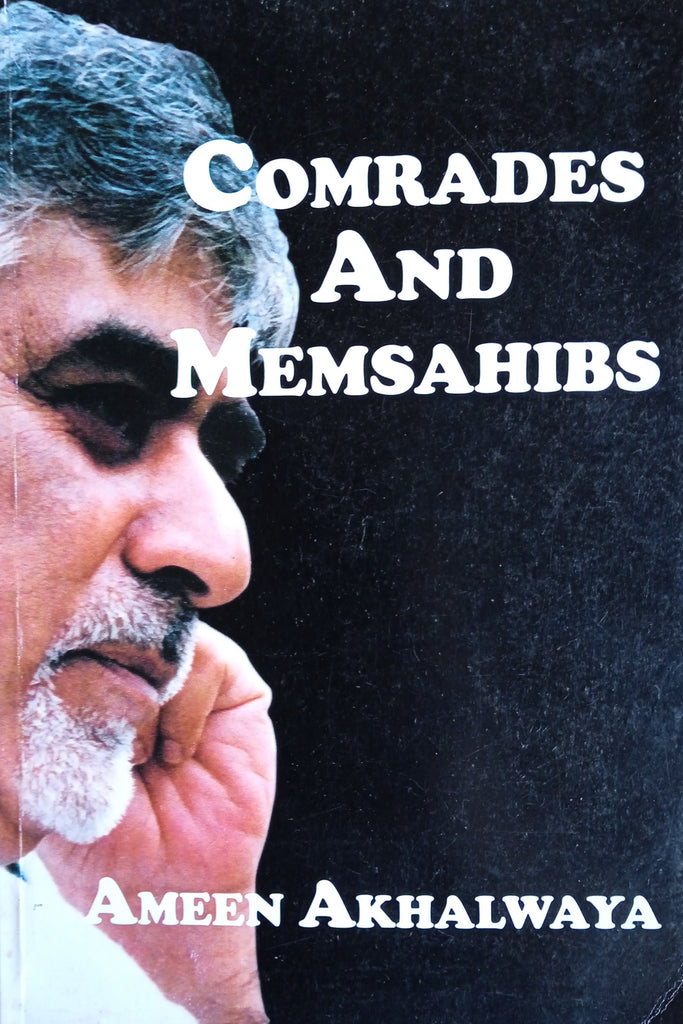
"Comrades and Memsahibs", a collection of Ameen Akhalwaya's writings, can still be found in bookstores
Kanthan Pillay bids farewell to one of South Africa’s foremost journalists
Ameen Akhalwaya chuckled as he lit a cigarette and took a lingering drag, savouring the taste. "Farida has been trying to get me to stop," he smiled. "I have to remind her it's the least of my worries."
We were sitting in his living room at his Rondebosch home. It was the eve of his departure to Johannesburg. Farida merely smiled in response as she handed out cups of tea and plates of biscuits.
Apart from hair that had silvered and smile lines framing the ever-present warm twinkle in his eyes, my friend had not changed much in more than a decade since I had last seen him.
It was difficult to accept that Ameen would not be returning to Cape Town — ever. Beneath that intelligent gaze and relaxed but alert posture, he was dying. Cancer of the colon had spread to his liver. It was no longer a question of years but months, maybe weeks.
"How are you feeling?" I asked.
"In pain, but comfortable. It's my friends that I feel for. They call me and ask, 'How are you?' I tell them I've got cancer. They don't know what to say."
I smiled at that. "I think most of us are used to thinking we can change the world. Now, we feel frustrated. I think this is rather bad manners on your part to be doing this to us."
Snapshots: Enters the Rand Daily Mail as a freelance reporter in 1971. Becomes a founder member of the Media Workers’ Association in 1978. Awarded the prestigious Nieman Fellowship to Harvard University in the United States in 1981.
I met Ameen at around this time. I had begun my career in journalism months before in 1980. At that time, many of the more prominent names in black journalism — Zwelakhe Sisulu, Joe Thloloe, Percy Qoboza — were either banned or imprisoned or exiled. Post Transvaal had been shut down. A vacuum had been created.
Amidst this gloom, Ameen’s words shone out as a beacon of hope for black journalism. Elegantly structured, always well-informed, witty but never vulgar, I thirstily lapped up every sentence, thinking "Wow, I wish I could write like this."
The Nieman Fellowship is for many of us the Holy Grail of journalistic recognition. Newspaper management had normally shared that recognition by announcing the promotion of Nieman fellows before their departure.
When Ameen’s selection was announced, all of us celebrated. His victory was our victory. And we looked expectantly for the announcement of his promotion. It was never forthcoming.
On his return from Harvard to the Rand Daily Mail, he was given the title of Metropolitan Editor — in his own words "a fancier title for a municipal reporter".
He resigned soon after and was accused of being "too ambitious". Many of us were outraged. Ameen was a Nieman fellow, a sought-after speaker at international conferences, a contributor to the foremost international newspapers and magazines. Surely he deserved better? Ameen refused to be bitter.
He began a weekly column which appeared in Post Natal and Die Vaderland, and it is here that I believe he did his finest work. Editors Denis Pather and Harald Pakendorf allowed him the breathing space to give free rein to his creativity.
When Ameen launched The Indicator in 1985 as the first anti-apartheid newspaper, the odds were stacked against him. I and many other full-time journalists supported The Indicator by feeding stories to the paper. We did so because we cared for Ameen, but more especially because we knew that our words would be carried more fully than on our own titles.
I left the country soon after. The Indicator grew in stature, but never made money. Ameen eventually moved to the SABC as executive editor of current affairs. Thrown into a vicious environment with no support, he resigned.
It was while he was part of the team driving the 2004 Olympic Bid that his cancer was diagnosed. Had they operated at the time, he might have stood a chance. Instead, he put the bid first.
I can only repeat the words I said to my friend as I left him: "Ameen, you were one of the few people in this world that I looked to for inspiration. You were my role model and defined my standards of excellence. You have lived more in your years than most people in twice that time. Your life was worthwhile."
• Cape Times
